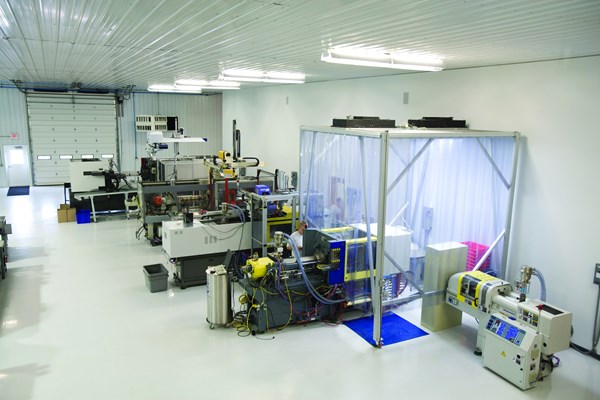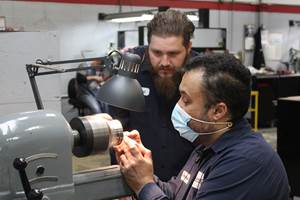Michigan Coast to Coast: Collaboration Expands Capabilities
The Michigan Coast to Coast Tool & Die Collaborative (MCCTD)—formed in 2008 under the Michigan Renaissance Zone Act (Renaissance zones are virtually free of all state and local taxes for businesses located within their boundaries)—is comprised of 13 companies (see MCCTD Members Sidebar, page xx) that joined forces to expand their own operations and support one another in a globally competitive market.
The Michigan Coast to Coast Tool & Die Collaborative (MCCTD)—formed in 2008 under the Michigan Renaissance Zone Act (Renaissance zones are virtually free of all state and local taxes for businesses located within their boundaries)—is comprised of 13 companies (see MCCTD Members Sidebar, page xx) that joined forces to expand their own operations and support one another in a globally competitive market. A total of 370 employees serve the state of Michigan.

According to JoAnn Hinds, President of Diamond Die & Mold Co. and spokesperson for the MCCTD, the companies initially banded together to diversify the services each company was able to offer. “At first, our biggest hurdle was sharing information,” she recalls. “Traditionally this did not occur within the tool and die sector since competition was so fierce, but after three years of working closely together through face-to face meetings, company visits, building our website, etc., we have realized the advantages that collaboration has brought to our members.”
In agreement is Richard Kleyn, President, Precision Design & Manufacturing, Inc. “We have built strong working relationships with others in our collaborative and shared and received work that has opened doors for other opportunities to help us grow and become more diverse in the related industry we serve,” he notes.
Membership Has Its Benefits
Together, the MCCTD has 380,000 square feet of manufacturing space with locations across the state of Michigan. “We have the ability to provide goods and services in more than 47 different areas of manufacturing,” Hinds explains, “including plastic injection molding, precision machined parts (plastic and metal), broaching, checking fixtures, EDM, and wire harness equipment.”
The MCCTD is divided into six teams:
1. Automation Team
2. Metalforming and Fixturing Team
3. Plastic Products and Development Team
4. Wire Harness Tooling and Equipment Team
5. Machined-parts Team
6. Specialty Machining and Tooling Team
“Any one company may receive a quote package and only be able to quote one portion of the package,” Hinds explains. “That company would then look at the MCCTD capabilities sheet and send out request for quotes to the companies that could fulfill the remainder of the quote. After receiving all quotes back, the original company would put together a package quote to submit; and the original company remains responsible to the customer. We hope in the future that the collaborative will become the responsible party.”
Midwest Mold President John Hill also sees the benefit in sharing programs. “Our company has obviously benefited by the reduced tax liability, but the greater value of belonging to a collaborative is having access into the minds of successful individuals whose past success may solve someone else’s current challenges,” he comments.
Together, the collaborative also pursues government certification and grants. Hinds notes that education grants received from the State of Michigan often allow the MCCTD to piggyback when it comes to attending classes. “For example, if three people are allowed to attend a class and you only have two available people, we can offer the third person position to another company within the collaborative,” she notes.
Members of the collaborative also have been pursing lean manufacturing, which Hinds points out allows them to function efficiently while maintaining quality. “More than 90 percent of the companies in the collaborative have applied the lean principles to all or most of their departments (office, quoting, manufacturing, design/engineering, assembly/tryout) using grant money to help cover some of the costs,” she elaborates. “Evaluation of a Material Resource Planning (MRP) software system is being reviewed by several members, which will help us monitor the progress of each job and control the flow through the department work centers. Once we have it up and running by year’s end with bar code readers, we will use the data collected to help us schedule people and machines more efficiently.”
A Strong Future
When it comes to future plans, the MCCTD is thinking big. “We plan to incorporate trade shows into our marketing program, improve marketing materials, expand further into government arenas, and increase our web exposure,” she says. “We would like to reinstate Michigan as the manufacturing hub of the world. We hope to achieve this through cooperation with other collaboratives that have been established in Michigan with the cooperation of such as organizations as the Michigan Manufacturing Association (MMA), Automation Alley, and the Tooling, Manufacturing and Technologies Association (TMTA).”
Mike Zacharias, President of Extreme Tool & Engineering, Inc., also can attest to the challenges local mold manufacturers are facing. “Nowhere in the country has anyone faced more difficult business circumstances than in Michigan, and our group provides a unique opportunity to learn from others, versus experiencing every difficulty on our own,” he emphasizes. “I have been a member of several trade associations, and I feel strongly that this group—by nature of its formal organization—exhibits the best/highest level of information sharing/etc., of any group we have had opportunity to participate in.”
“We are most proud of our ability to cooperate and share the strengths of our member companies,” Hinds concludes. “The tool and die industry is very competitive and we believe that our willingness to collaborate is an achievement that will enable us to grow stronger with time.”
Related Content
Making Mentoring Work | MMT Chat Part 2
Three of the TK Mold and Engineering team in Romeo, Michigan join me for Part 2 of this MMT Chat on mentorship by sharing how the AMBA’s Meet a Mentor Program works, lessons learned (and applied) and the way your shop can join this effort.
Read MoreMMT Chats: Eliminating the Noise to Stay Focused on the Customer
Metro Mold & Design joins me to discuss the value of the 80/20 rule as a business strategy, its talented cross-functional team, the role of automation in mold building and molding, and the continuing impact of COVID-19.
Read MoreQuestions and Considerations Before Sending Your Mold Out for Service
Communication is essential for proper polishing, hot runner manifold cleaning, mold repair, laser engraving and laser welding services.
Read MoreHow to Use Scientific Maintenance for More Accurate Mold and Part Troubleshooting
Discover how adopting scientific maintenance approaches helps improve mold lifespan, minimize failures, and optimize production outcomes.
Read MoreRead Next
How to Use Continuing Education to Remain Competitive in Moldmaking
Continued training helps moldmakers make tooling decisions and properly use the latest cutting tool to efficiently machine high-quality molds.
Read MoreAre You a Moldmaker Considering 3D Printing? Consider the 3D Printing Workshop at NPE2024
Presentations will cover 3D printing for mold tooling, material innovation, product development, bridge production and full-scale, high-volume additive manufacturing.
Read MoreHow to Use Strategic Planning Tools, Data to Manage the Human Side of Business
Q&A with Marion Wells, MMT EAB member and founder of Human Asset Management.
Read More




















